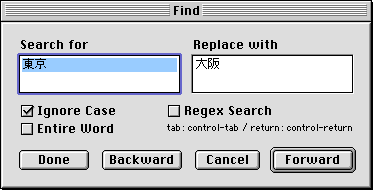|
Expression |
|
Description |
|
|
| . (period) | | Matches any character other than return character
or “.” if specified in Character Class. |
|
| \s | | Matches any blank character
or “s” if specified in Character Class.* |
|
| \S | | Matches any character other than blank character
or “S” if specified in Character Class. |
|
| \b | | If specified in Character Class, matches a backspace (\x08). |
|
| \e | | Matches an escape (\x1B). |
|
| \f | | Matches a form feed (\x0C). |
|
| \n | | Matches a line feed (\x0A). |
|
| \r | | Matches a carriage return (\x0D: return character for Macintosh).** |
|
| \t | | Matches a tab (\x09).** |
|
| \xHH | | Matches a character by hexadecimal code. (HH is hexadecimal number by 1 to 4 figures.)
\x9, \x09, \x009 and \x0009 are equivalent (at least in QuoEdit). To distinguish easily the hexadecimal code and characters that follow, use 4 figures. |
|
| \cC | | Matches a control character. C is an alphabet. |
|
| \C | | Matches the character that follows ‘\’ if the sequence is not metacharacter. (C is any character.)
Always case sensitive.
‘\’ makes the metacharacter that follows literal character and it is called “escape”.
For example:
\| —> matches “|”
\\ —> matches “\” |
|
| C | | Matches the character itself if not metacharacter. (C is any character.)
For example:
a —> matches “a” (or “A” if Ignore Case option is on) |
|
| [...] | | Character Class: matches one of the characters in the bracket.
Always case sensitive.
‘-’ can be used to specify a range (in the character code).
To specify the character “-”, put it at the beginning or the last.
Character specifiers listed above (except period, \s and \S) are available in the character class. But note that other metacharacters (like position specifiers) are not interpreted as metacharacter any more in the character class (except ^ at the beginning).
For example:
[abc] —> matches “a”, “b” or “c”
[a-z] —> matches “a”, “b”, “c”, ...... “y” or “z”
[a-z-] —> matches “a”, “b”, “c”, ...... “y”, “z” or “-” |
|
| [^...] | | Negative character class: matches any character not in the bracket.
Always case sensitive.
For example:
[^0-9a-zA-Z]
—> matches any character other than alphanumeric characters |
|
